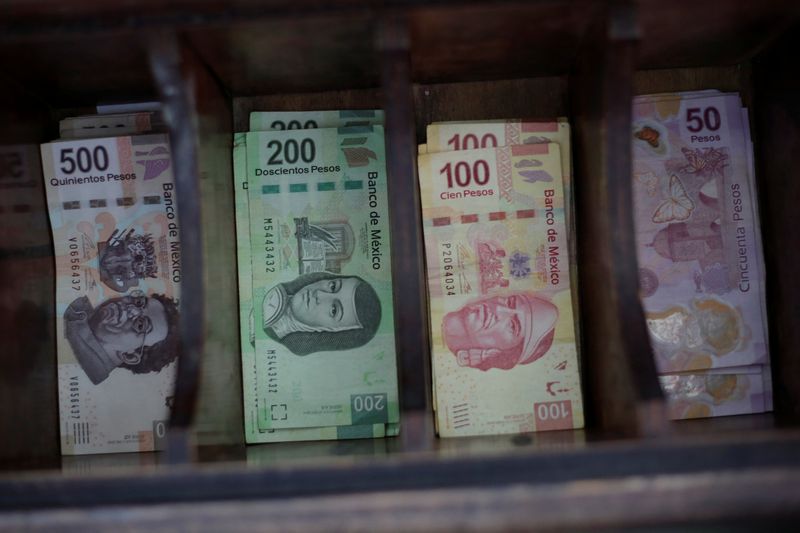LONDON/NEW YORK (Reuters) -Mexican stocks fell over 6% on Monday and the peso closed at its weakest to the dollar since November after the country’s ruling party scored a surprisingly strong election result and looked poised for a super-majority in Congress that markets fear might bring constitutional change and diminish checks and balances.
Claudia Sheinbaum won a landslide victory in Sunday’s presidential election, as had been widely expected. But the scale of the gains for the Morena party and its allies took markets by surprise, with some fearing the results would pave the way for the ruling coalition to pass constitutional reforms without opposition support.
A two-thirds super-majority in both chambers of Congress is still in the cards for Morena, which also won the mayoral race in Mexico City by a double-digit margin.
The Mexican peso earlier hit a fresh seven-week low of 17.754 to the dollar, a 4.29% drop, LSEG data showed. It ended the session down 3.8% at 17.671 per dollar, its weakest daily close since November.
“The question is whether the Morena party has done so well that it could command a super-majority and try to pursue market non-friendly policies of constitutional reform,” said Chris Turner, global head of markets at ING.
The latest losses mean the peso has weakened more than 4% since the start of 2024, a sharp turnaround for the currency, which was, until recently, one of the few in emerging markets to have gained ground against a strong dollar this year.
Mexico’s benchmark stock market index ended the session down 6.1%, while the MSCI index, priced in dollars, dropped 8.8%. The iShares MSCI Mexico ETF closed 10.7% lower.
“The main challenge for president-elect Claudia Sheinbaum will be to bolster market sentiment and provide a predictable and investment-friendly policy and regulatory framework,” Alberto Ramos, head of Latin America economics research at Goldman Sachs, said in a client note.
“Ultimately, the new administration will be challenged not to encroach on private sector activity and free markets, and to avoid further erosion of institutional quality.”
CONCILIATORY TONE
Foreign currency sovereign bonds were little changed overall, with the spread measured by JPMorgan’s EMBIGD index widening by six basis points to 306 bps. The cost to insure five-year Mexican sovereign debt via CDS rose by six basis points to 101 bps, according to S&P Global, while those of Pemex ticked up one basis point to 471 bps. The local debt benchmark bond yield rose 16 basis points to 9.934%, the highest since April 30 according to LSEG.
Sheinbaum, a climate scientist and former mayor of Mexico City, won the presidency with just shy of six votes in ten, with 92% of ballots counted, in what is set to be the highest vote percentage in Mexico’s democratic history.
“Even if Morena fell a bit short of achieving a two-thirds majority in the Senate, opposition parties could swing and favor Morena on issues that could significantly impact the business environment” said Alejo Czerwonko, chief investment officer for emerging markets Americas at UBS Financial Services.
In February, President Andres Manuel Lopez Obrador had proposed sweeping constitutional reforms, including measures to overhaul the judiciary, electoral law, pensions, and environmental regulations.
Lopez Obrador said in a morning press conference on Monday that Mexico’s finance minister, Rogelio Ramirez de la O, will remain in his post for some time to help facilitate the transition.
When asked about the possibility of pursuing major reforms in Congress once new lawmakers are seated on Oct. 1, Lopez Obrador said he would discuss the topic with his successor.
“We have to get on the same page to discuss these initiatives with Claudia, as well as other things we need to work on together,” Lopez Obrador said. “I don’t want to impose anything.”
Throughout the course of his tenure, Lopez Obrador had doubled the minimum wage, reduced poverty and oversaw a strengthening peso and low levels of unemployment – successes that made him incredibly popular.

Sheinbaum has promised to expand the welfare policies that drove the current president’s popularity and led to her election triumph, but it will be a tricky task because of the hefty budget deficit and low economic growth.
JPMorgan noted the conciliatory tone of Sheinbaum’s acceptance speech, which she directed to all Mexicans. She also “sought to calm down markets by stressing that her administration will guarantee an autonomous central bank, keep the division between economic and political powers, abide by legality and preserve a disciplined fiscal stance,” JPMorgan said in a client note.
To read the full article, Click Here

